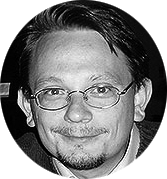
|
|
|
Workshop on lifetime and stability of hybrid and organic devices 21-22 april 2016 Paris, France
 A significant challenge for the successful commercialization of organic devices, is their limited lifetime. Extrinsic as well as intrinsic factors cause deterioration of device performances during operation and these therefore needs to be thoroughly investigated to minimize their influence. The extrinsic degradation is generally the result of oxygen and moisture diffusion from ambient into the device causing a reaction with the active layers or the cathode in both light-emitting diodes and solar cells. The intrinsic degradation is arising from intrinsic processes, in which the device materials change structure with time during normal device operation. This can e.g. be morphological or chemical changes in the active layers that lead to trapped charges, which can alter both the charge carrier profiles and recombination rates. The problems induced by both extrinsic and intrinsic factors are NOT straightforwardly solved and thus represent a principle obstacle for use and commercialization of hybrid and organic devices.
A significant challenge for the successful commercialization of organic devices, is their limited lifetime. Extrinsic as well as intrinsic factors cause deterioration of device performances during operation and these therefore needs to be thoroughly investigated to minimize their influence. The extrinsic degradation is generally the result of oxygen and moisture diffusion from ambient into the device causing a reaction with the active layers or the cathode in both light-emitting diodes and solar cells. The intrinsic degradation is arising from intrinsic processes, in which the device materials change structure with time during normal device operation. This can e.g. be morphological or chemical changes in the active layers that lead to trapped charges, which can alter both the charge carrier profiles and recombination rates. The problems induced by both extrinsic and intrinsic factors are NOT straightforwardly solved and thus represent a principle obstacle for use and commercialization of hybrid and organic devices.
In the framework of the THINFACE project, we propose a workshop on lifetime and stability of hybrid and organic energy devices that includes all involved experts and younger researchers from the THINFACE network together with external experts from the community in France and abroad.
The aim of the workshop is to discuss common strategies and solutions for improving the lifetime and stability of organic devices and hybrid systems such as perovskite.
Researchers, private companies, PhD candidates and master students are welcome to register to the event.
Download the poster poster_workshop_file
Speakers
Session Organics : thursday april 21st |
Session Perovskite: friday april 22nd |
|
Photostability and photodegradation mechanisms in organic semiconducting BHJ composites |
Large area Perovskite Solar Cells: Fabrication and Stability |
|
Reliability of emerging PV technologies: identifying degradation mechanisms in a plethora of device architectures |
 Shahzada Ahmad, Abengoa, Sevilla, Spain Shahzada Ahmad, Abengoa, Sevilla, Spain |
|
Institut des sciences analytiques et de physico-chimie pour l'environnement et les matériaux, Pau, France |
|
|
|
|
|
Sylvain Chambon, University of Bordeau, France Degradation Mechanisms in Organic Solar Cells: The Role of Interfaces |
How Photoelectron Spectroscopy can be used to investigate organic-inorganic perovskites? Chemical, Electronic Structure |
|
Benedikt Gburek, Heliatek, Dresden, Germany Efficiency and Lifetime of Small-Molecules OPV from Lab to Fab
|
|
Important dates
Submit your abstract, 30th january 2016 to 1st april 2016
Registration, 30th january 2016 to 21st april 2016
Workshop, 21st april 2016 at 14h00 - 22nd april 2016 16h30
Registration fees
Registration fees of 50 euros apply for regular participants that include the cocktail on april 21st and the lunch of april 22nd.
Master students are waived from fees and will not be supported for the lunch.
Only bank transfer are accepted, no payment will be accepted at the workshop place, in case of cancellation no refund will be possible.
Registration is mandatory in any cases and will be confirmed for regular participant after receiving the bank transfer.
Organizing committee
|
|
|
Sponsors
The workshop is sponsored by Sorbonne Universités (Séminaires internationaux de recherche), Institut Français du Danemark (Programme IFD), Framework Programme 7 from EU (ITN THINFACE)

 Christoph Brabec
Christoph Brabec  Aldo Di Carlo
Aldo Di Carlo Tom Aernouts,
Tom Aernouts, Roger Hiorns,
Roger Hiorns,  Ruediger Berger
Ruediger Berger Vida Engmann,
Vida Engmann,  Jacky Even
Jacky Even Bertrand Philippe
Bertrand Philippe


